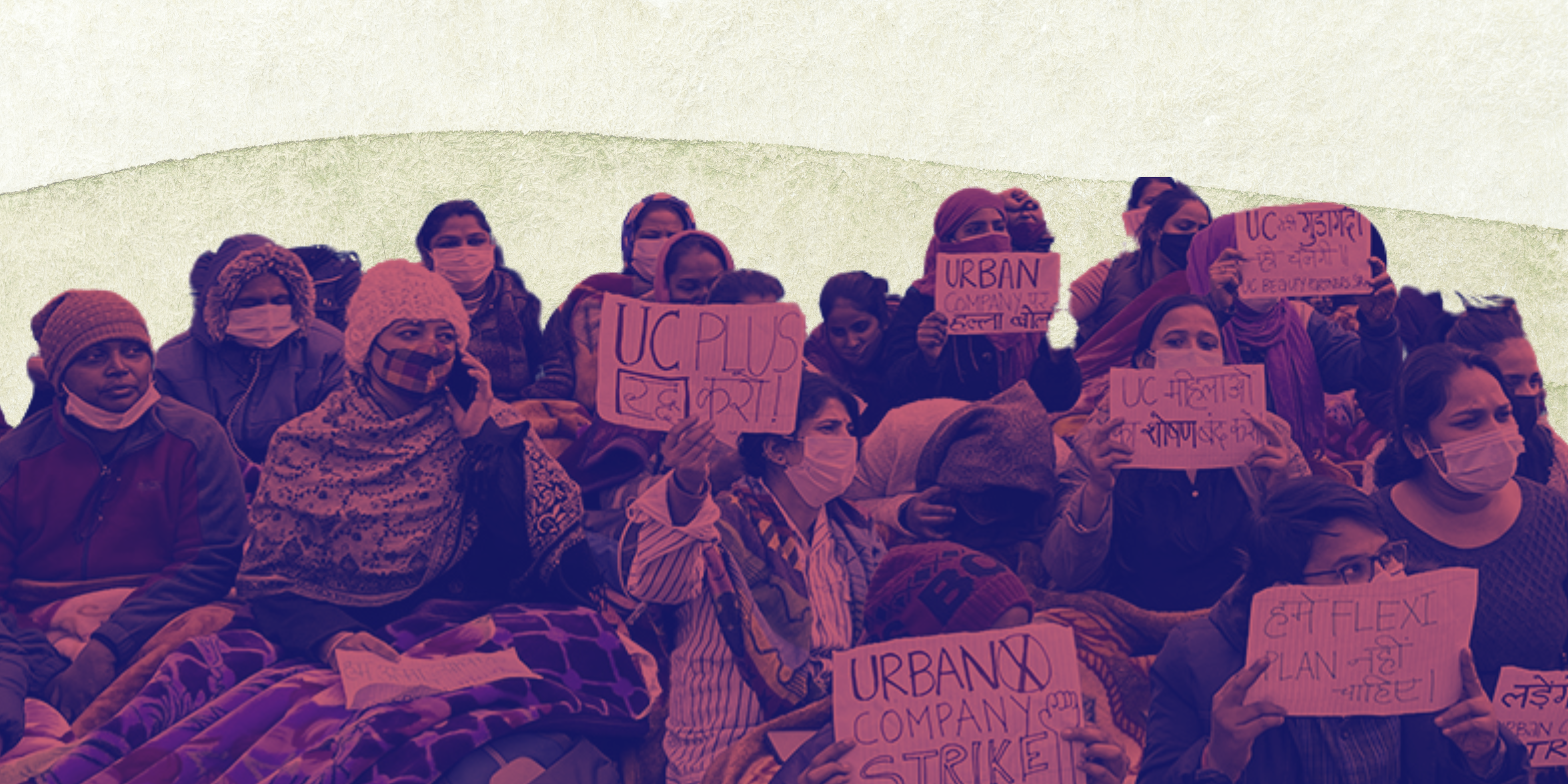Illusion Of Freedom Vs Tyranny Of Gig Work: The Dilemma Of Urban Co’s ‘Partners’
There are rising tensions between the aspirations of thousands of workers and the work structure of the gig economy
- Saumya Kalia

Parul*, 29, an Ahmedabad-based beautician, keeps returning to a four-day-old text message on her phone: “Your profile has been deactivated and is not eligible for getting customer leads at Urban Company.” Her journey with the Urban Company, an online platform for providing home based services such as beauty, cleaning and repair services, started more than three years ago. But now, the mobile application has blocked her account permanently, a penalty for cancelling a visit request from a client.
Parul says she was not at fault – she had to cancel the appointment because a machine used in facial treatment had malfunctioned. The Urban Company (UC) helpline acknowledged her problem but offered little resolution. But Parul has not given up yet, she is still hoping for a request – for a pedicure, detan, or the best of them all, a facial.
Parul had once found freedom in the company’s employment model. “UC was flexible,” she says. It paid more than a salon job, and did not impose rigid work hours. When Parul took on hour-long bookings, her neighbours would care for her year-old daughter. There was a spontaneity to this routine she did not mind. “Now there is nothing I can do but wait,” she says.
To understand the employment dynamics at Urban Company, we interviewed 10 women beauty professionals who partnered with the company. The conversations showed rising tension between how the company hotwires the aspirations of thousands of women even as it remains rooted in the exploitative work structure of the gig economy. In all such companies, opaque algorithms, clients, and companies assign value to the professionalised work that partners offer. Through all of it, “partners” closely hold on to the illusion of choice.
The scaffolding of the UC model is rickety, our investigation showed. We explain below how it is built on exploiting labour by feeding off structural vulnerability and State inaction. Hoping that companies that seek to maximise profits would also champion worker rights could be an illusory expectation that mislays accountability, and misdirects how gig workers can be protected from exploitation, we show.
A Business Driven By Women
Urban Company, which began as Urban Clap in 2014, has grown in heft, with a valuation placed at $2.8 billion in December 2021. It is a business that banks heavily on female labour: as of June 2020, the Beauty and Wellness category, with a dominantly female cadre, contributed approximately 55% to its revenue. By 2030, this vertical is expected to be a key driver of the business. “We are constantly expanding and aim to train and upskill 5,00,000 service partners, of which 2 lakh will be women partners,” Anand Dureja, UC’s vice president, has said in an interview.
In 2021, an average of 11,000 were employed as partners in the Salon and Spa category. This number has grown from 450 in 2016 to 8,000 in 2019, according to a study. Most beauty workers in Urban Company are young, married women with children, who are looking for flexible work hours to balance employment with household and childcare responsibilities. They find the “gig economy quite easy to enter, as compared to the formal labour market”.
On average, partners earn Rs 280-300 an hour after accounting for commissions (ranging from 8.5% to 30% of the order), product purchases (17%) and travel costs (8%), according to company figures. These earnings vary according to the number of tasks, but for many, the income surpasses what they would earn at a salon job where average monthly income ranges between Rs. 8,000 and Rs. 15,000).
Partners have to pay a penalty in case of cancellation by customers, and before October 2021, there was no cap on how much could be imposed on them in a month. After the partners struck work, the penalties were capped at Rs 1500.
In October 2021, more than 100 beauticians and spa attendants had protested high commissions, low wages, no insurance, and unsafe work conditions, detailing accounts of harassment and abuses. After negotiations, UC revised its work policies – it capped commission rates at 25%, restricted penalties and reduced the price of some high-demand products by 10%. As of January 2022, partners offering salon services were earning an average of Rs. 29,164 per month – after deducting Rs. 31,907 for commission, product, and travel costs.
‘Lucrative opportunity’
Women have for the longest time upheld the informal, and often unpaid, economy. And now, at a time when female participation in the workforce is at an all-time low, Urban Company is still actively recruiting.
“There is definitely a lucrative opportunity being provided,” says Mounika Neerukonda, a researcher with Fairwork India, an international organisation researching labour practices in the platform economy. Urban Company recently ranked the highest in the latest FairWork ratings, an index that evaluates the working conditions of gig companies. “But whether they are being safeguarded from all potential risks … that’s an entirely different question,” she adds.
Workers like Parul complain that they find it increasingly difficult to get in direct touch with platform representatives. There are further delays in processing medical insurance requests and accident claims, and technical glitches where the app picks up the wrong location or fails to show a booking create obstacles in the general course of work, they say. Compensations remain inextricably tied to “good” ratings from clients, a dynamic that invests customers with disproportionate power.
According to Rikta Krishnaswamy, Delhi-NCR coordinator of the All India Gig Workers Union (AIGWU), the protests only helped the company “sharpen their PR game”. The conditions for women have remained stagnant at best and deteriorated at worst, “and it’s only going to worsen”, she predicts.
Between promises and precarity
In February 2019, a friend told salon worker Sheena about Urban Company. She was earning about Rs. 7,000 a month then and working shifts that often lasted 12-13 hours. Most women who work at salons share similar stories: most have studied upto Class 10 or some upto Class 12 and have done a skill-based course in beauty. Some try setting up their own parlours while others work at neighbourhood outlets.
This parlour work is often defined by limited earnings, long work hours and absent childcare support. The rigidity of this model goes unquestioned in the absence of better-paying alternatives. It is also the context in which women beauticians usually hear of Urban Company, either through advertisements or community networks. “A lot of women have heard of UC from their friends and family, and that’s how they sign up for it,” says Sai Amulya, a researcher with FemLab, a feminist organisation that looks at labour rights in digital platforms.
The value of UC is assessed in terms of before and after they sign up – before, it is the offline parlours that act as the reference, we found. Fairwork surveyed several UC women, and found them responding with a sentiment that is at variance with the anxiety and anger that most other gig platforms generate: it was one of empowerment. In theory, the promise is of higher wages, flexibility, and a greater degree of independence. Women who work as salon service partners recorded a 60% higher net monthly income, while working for fewer hours than offline beauticians, according to a study commissioned by the company.
“A lot of them come from backgrounds where it’s hard to be a single mother, or they crave independence from their families. Sometimes they’re stuck in a debt… or they do not have the opportunity to make anything more than a salon’s income,” says Neerukonda, who was part of the Fairwork research team. UC then presents as an employment opportunity with magic dust around it.
On gig platforms, an invisible algorithm supervises work, not an overbearing employer. Because of this a lot of workers are indifferent to the absence of adequate social welfare measures. “Even in beauty parlours, there is a lot of abuse,” as Amulya points out.
Their association with UC also gave women a better self image: they are trained, upskilled, given equipment, coached how to greet, interact and work with a client, elements of professionalism that changes how they see themselves. Moreover, “there’s something very satisfying in becoming professionalised in something that means somebody, some company is investing in them,” explains Payal Arora, founder of FemLab. “When you start bringing money home, then your position does change… and people are able to use their work to negotiate family decisions.”
Arora points out that a field where women workers dominate is often accorded low status and pay through the ‘feminizing of labor’. In theory, app-based platforms like UC could reset the value attached to work traditionally done by women. “The company keeps irritating some women every now and then, but it’s okay,” Sheena says. With Urban Company, “azaadi hai (there is freedom)”, she says.
Workers, But Consumers Too
Critics of UC say these advantages have to be put in perspective.
For instance, UC was among the three digital labour platforms offering the hourly local minimum wage (the basic income to ensure a worker is not pushed into poverty). But, like other platform economies, it failed to offer the local living wage (the income required to sustain a decent standard of living based on geography and family size).
In 2018, the company ran a recruitment clap at a slum sitting at the edge of Bengaluru. Speaking to a group composed predominantly of migrant workers, it promised a “better life,” according to a field report by the All India IT and IT Enabled Services Employees’ Union, Karnataka. This better life would be accessible if people were to pay Rs. 16,000 (to work as cleaners) or Rs. 30,000 (as beauticians) and would include joining and training fees, and also the cost of the beauty/cleaning kit that is instrumental to their work.
“Just like Ola and Uber where you’re paying for your own car and you are locked in with the EMI system, this is a smaller level where you’re locked in with the beauty kits,” explains Neerukonda.
But this is not a small amount and it is an investment that locks you into the platform. Most women usually take a loan from the company itself, and this amount keeps reducing as they complete jobs. In other cases, they have to rely on their husbands or families.
In 2016, when she conceived, Parul put her account on pause. She applied to rejoin UC after her daughter’s birth, and was offered a “discount” on the onboarding cost. She got another phone, made a new ID, paid Rs. 15,000 to join a company she was already a part of. Krishnaswamy says this goes beyond exploitation, “more like expropriation” where an authority takes ownership of something for their own benefit.
As UC onboards more women, daily bookings are falling because the beauty work is now split into three categories based on the services provided: Classic, Prime, and Luxe. The women BehanBox spoke to mention that there is a surge of new recruits in the Classic category (the basic category) of work so much so that supply exceeds the demand for services. But women continue to depend on the platform because of the company’s scale and en-masse hiring. “They’re kind of monopolist in the way they function,” Krishnaswamy adds.
There is also an added insistence that all workers purchase beauty products from the company itself at prices higher than the market rate to ensure “quality control”. This, says Krishnaswamy, is a “cunning narrativisation” that turns workers into the platform’s consumers too, further denting their earnings.
In May this year, the company announced a health insurance policy of Rs. 2 lakh that can be availed by submitting medical prescriptions. Sheena met with an accident in August while travelling to a client’s home. “They asked me to submit documents and said they will call back,” she says. But they never did. On her part, she didn’t push too. “They don’t listen so there’s no point in asking them. We can earn that much by working extra for a client.”
Tyranny Of Client Rating
The question of who gets to work is dictated by “response rates,” the most recent trigger point, as several women in recent months report their IDs disabled for arbitrary reasons. Every partner is required to maintain a performance rating of 4.7 now, and there is a five-penalty policy (Penalties are levied if a partner cancels on a client. With each penalty there is a deduction in the amount they get) after which the partners’ IDs would be permanently blocked. “When we joined, we had to maintain a rating of 4.5. Then the bar increased to 4.6. And now it has increased to 4.7. It is very difficult… there is so much pressure,” says Sheena.
If someone’s ID is blocked for any reason – legitimate or otherwise – the worker has no power to challenge the decision. A spokesperson from Urban Company says there are designated category managers available to address workers’ needs. Urban Company “does not tolerate and prohibits” discrimination on grounds of religion, caste, class, ethnicity, and gender, it states on its website. But on multiple occasions, partners’ concerns go unaddressed either due to unresponsive helpline agents or a limited understanding of workers’ challenges, we found.
This is a sore point for workers especially when they report misbehaviour, harassment, or abuse at work. Spa therapists working with Urban Company – men and women – mentioned instances of sexual harassment where their clients expected sexual favours, as per a report by the People’s Union for Democratic Rights.
Last month, a customer refused to pay Kaanchi* for a pedicure citing poor service. “She picked up my bag and threw it out. I was in tears and I called the helpline, completely helpless about what to do,” she told BehanBox. The helpline sympathised, but offered no other support. Kaanchi got a bad rating that day and her account was blocked. She felt harried and helpless: as a single mother, she had to pay her children’s tuition fees, the house rent, and support her parents. People who have been with UC longer, seen the company grow and have grown along with it, have now hit a dead end in terms of promotion and agency.
MG Plan – The Silver Bullet
In December 2021, UC floated the Minimum Guarantee Plan (MG plan), a subscription-based model, without consulting its “partners.” The idea was to give 60 guaranteed jobs to women workers of which they would complete at least 80%. Women would pay Rs. 3,000 to sign for the MG plan, and for every job done, they would get some amount back. The subscription model was supplemented with a category system, segregating the workers into “Flexi,” “Smart,” and “Plus” categories. If someone refuses to subscribe, they would automatically be placed into “Flexi” and would be restricted to work only three days a week – Friday to Sunday, according to protesting partners.
“When the company changes its policies, the narrative is always couched in some language of benefit,” Rikta remarks. But “it wasn’t an incentive, it was a penalty.”
In some cases, the guaranteed 60 jobs never materialised. In a letter, Sneha Sinha, the Delhi representative of UC’s partners union, said: “We strongly protest the ‘work for fees’ policy, which has been presented under the disguise of a minimum guarantee plan.”
Moreover, key concerns about the semantics of the plan were never resolved. What if there is an emergency? Does the balance carry forward to the next month in case one is unable to meet jobs? “The management didn’t have an answer to these very real scenarios,” adds Rikta.
The plan led to protests in Delhi-NCR; the company responded first by engaging with them and then filed a case against them – the first instance where a new-age internet company sued its gig partners. The MG plan was an answer to a problem that should not have existed in the first place – the scarcity of jobs. If anything, it demanded regularisation from workers who had been promised flexibility.
While the fight and struggle were beneficial for all workers, the protestors’ accounts were reportedly either deactivated or “shadow-blocked (where partners had access to the platform but were unable to accept bookings),” resulting in a loss of work.
Gaps in Labour Laws
A report by the Indian Federation of App-based Transport Workers (IFAT) summarises the conditions of work common to platform economies like Zomato, Ola, Uber, Blinkit, Swiggy, and Urban Company thus: “…the role of app-based companies in exploiting workers through an opaque algorithmic system, which determines who gets to work and how they will be compensated. These systems also determine penalties and grievance redressal, which have an impact on occupational health and safety. Critically, the design of systems and logic of compensation are completely invisible to workers, undermining their capacity to protect their rights.”
In India, gig workers are “partners” or “independent contractors” and they are excluded from the ambit of State regulation. Here are some questions generally considered while deciding what can be classified as gig work: Is the work controlled by the employer? Is the person heavily dependent on the platform for earnings? Are they spending the majority of their work day working for said company? Is the work supervised? Like other gig workers, women working with UC fit all these criteria to be identified as an employee – and this categorisation should entitle them to protection under labour laws.
However, in October, UC’s co-founder Abhiraj Bhal stated unequivocally: “We don’t have an employer-employee relationship with them. We are very clear about that.”
In 2021, platform and gig workers were brought under the scope of labour laws for the first time. The Code on Social Security, 2020 (COSS) attached a definition to a gig worker: “a person who performs work or participates in a work arrangement and earns from such activities outside of traditional employer-employee relationship.” Platform work was defined as: “a work arrangement outside of a traditional employer-employee relationship in which organisations or individuals use an online platform to access other organisations or individuals to solve specific problems… in exchange for payment.”
The two definitions are vague, as activists and labour scholars have pointed out. “The words and phrases used make it very unclear who classifies as a gig/platform worker,” Neerukonda says. There remains apprehension that gig workers will be placed in the same category as unorganised workers, thus removing the possibility of them ever accruing benefits of the formal economy while still participating in it.
Moreover, the other three labour codes proposed as part of India’s labour reform – the Code on Wages, Industrial Relations Code, and the Occupational Safety, Health and Working Conditions Code – refuse to define who a gig worker is. This excludes them from protections including caps on maximum work hours, safety measures, wage regulations, working conditions, and partaking in registered trade unions. “The labour laws codify this exclusion, by continuing to deny the protective labour laws are meant to offer to workers,” a report by AICCTU remarked.
Inclusion in COSS entitles the gig workers to accident insurance, health and maternity benefits and old age protection. “Maternity benefits are mentioned literally just as a phrase in the COSS, but that’s it,” Neerukonda points out, as if that’s all that women need as part of a social security net.
For instance, workplace legislations that guarantee maternity benefits and action against sexual harassment still do not apply to people working with gig platforms. The Sexual Harassment of Women at Workplace Act, 2013 (POSH Act) and the Maternity Benefit Act, 1961 – two important legislative resolutions that could aid women – carry strict definitions of “employers,” “workplaces,” and “employees.” The nature of these jobs demands that work is conducted either in client homes or in public spaces (while travelling). If abuse does take place, women gig workers will not be entitled to protection under POSH because the worker provides services in a “dwelling place or house,” not an official “workplace.”
The UC model foreshadows a future of precarity: As companies such as these mature, their working conditions become worse and their workers more disenfranchised. “This pauperisation [of workers in terms of remuneration and freedom] is kind of like an inbuilt feature of the system,” AIGWU’s Rikta remarks. “It’s not a bug, it’s a feature.” However, Arora counters that it is possible to reset the model. “You can be flexible and formalise the sector,” she says.
Way Ahead
A starting point to protecting gig workers is to know their strength and composition. Scholars recommend carrying out a census of workers to identify them, and further collecting gender disaggregated data to devise social welfare policies around maternity benefits and child care.
A parliamentary panel recently proposed formation of a social security fund, inviting stipulated contributions from employers, central governments, and state governments. The new COSS does mandate companies to contribute a sum (between 1-2% of the annual turnover, but not more than 5% of the amount payable to the gig worker) towards a fund too, but remains ambiguous on the subject of state and central governments’ contributions.
Also, the nature of work includes risks that are not traditional occupational hazards: discrimination, road accidents and abuse for instance. Prioritising the digital and physical safety of the workers can be a starting point for empowering workers.
A steady earning avenue is particularly beneficial for women who engage in gig work. Countries like the UK have also ruled in favour of offering pension, holiday pay, and income support when there are not enough jobs in a given month or the partner is unable to work.
In its blog, Urban Company noted they provide employment to a lot of women who might not be employed and be dependent on abusive husbands and families. But implicit in that responsibility is the onus of ensuring stable wages. “Especially when you’re taking in women, there’s a much more added responsibility to make sure that some of their earnings are safeguarded,” Neerukonda says.
A bigger push across gig platforms can come in the form of shifting the power from the client to the worker. This can start with a reverse-rating system, if a client is inappropriate towards a partner, the partner should have the right to rate that client or file a complaint against them anonymously, and eventually, there have to be consequences for bad ratings too.
[Photo credits: Rikta Krishnaswamy]
We believe everyone deserves equal access to accurate news. Support from our readers enables us to keep our journalism open and free for everyone, all over the world.




